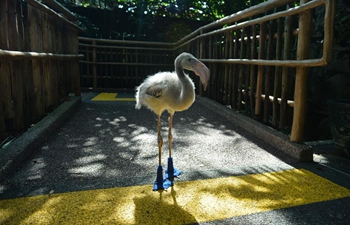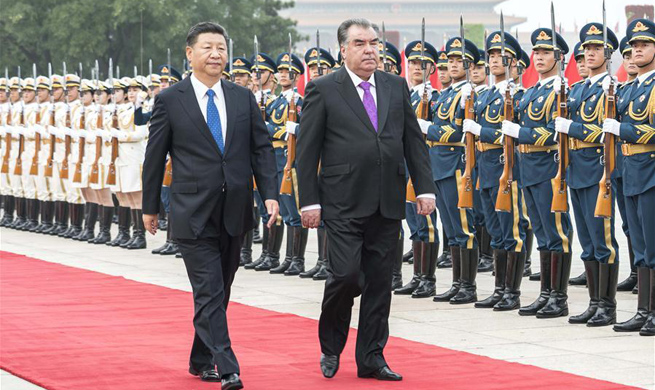HARARE, Aug. 31 (Xinhua) -- The Chinese government is forging a strong partnership with the World Food Program (WFP) to empower rural communities in Zimbabwe to become food self-sufficient and resilient to climate-induced shocks.
Through its partnership with WFP, the Chinese government has since 2009 provided millions of U.S. dollars for immediate food needs and long-term resilience building for vulnerable, poverty-stricken rural communities in Zimbabwe.
According to Chinese ambassador to Zimbabwe Huang Ping, China has since 2009 provided millions of dollars to the Zimbabwe government through the WFP to help the vulnerable cope with food shortages.
Over the past 10 years, the Chinese government provided five consignments of emergency humanitarian food aid to Zimbabwe, worth tens of millions of dollars.
It also provided agriculture machinery and fertilizers in the form of government aid and concessionary loans worth about 100 million dollars.
In 2015, China provided 330,000 dollars for training to small holder farmers in Zimbabwe.
In 2016, the Chinese government gave Zimbabwe 1 million dollars for lean season assistance and productive assets creation after the country suffered one of its worst droughts in 30 years which left a quarter of the rural population in need food aid.
It also donated 24.6 million worth of rice to help the country cope with food shortages. Besides the rice, China also provided 10,000 tons of urea to Zimbabwe and this year provided 12,173 metric tons of rice worth 14.7 million dollars to assist the food insecure.
This week, the Chinese government announced yet another 5 million dollars contribution to the Zimbabwe government through the WFP to assist refugees and resilience building among vulnerable communities in 2017 and 2018.
Ambassador Huang said China-WFP cooperation in Zimbabwe dates back to 2009 when it donated 5 million dollars through the WFP to Zimbabwe for emergency food aid.
Huang explained that China-WFP cooperation was cemented in 2016 when after a decade-long research and consultations, the two parties signed a Memorandum of Understanding to strengthen their partnership in ending global hunger.
With increasing collaboration each year, WFP is working with the Chinese government, leading Chinese companies and the Chinese public to help alleviate hunger within and beyond China's borders, Huang said.
"China has become an increasingly significant donor to WFP's global activities, with over 97.5 million in funding from the government of China as of October 2016, in support of WFP's operations around the globe," the envoy said.
WFP Zimbabwe country director Eddie Rowe hailed China-WFP cooperation, noting that over the past 10 years, the UN agency had benefited a lot from Chinese aid.
"Last year, through the Government of China and WFP, we established a center of excellence where WFP will be able to tap into the capacity of diverse nature that Chinese people can offer.
"Globally, WFP has more than 50 different projects through which we are enjoying the capacity of China in so many diverse ways," Rowe said.
Zimbabwe is one of the many countries in the world that are vulnerable to climate change, resulting in frequent droughts and floods which affect food production.
It is only this year after more than a decade that Zimbabwe was able to produce surplus maize of 2.1 million tons against national consumption of 1.8 million tons annually.
Nevertheless, it is estimated that 1.1 million people will require food aid during the peak hunger season from January to March 2018.
Cognizant of its adage which says that "give a man fish and you feed him for a day; teach a man to fish and you feed him for a lifetime", China has begun to strengthen its resilience building assistance in recent years to enhance the capacity of vulnerable communities in Zimbabwe to cope with climate-induced shocks.
One such project that has the potential to alleviate hunger and build sustainable and resilient communities is the half-a-million dollars weir, nutrition garden and orchard project that was handed over to the Shauke community in Zvishavane District of Zimbabwe by the Chinese government on Tuesday this week.
Funded by China, the project is being spearheaded by the WFP in partnership with its implementing local agency, the Adventist Development and Relief Agency Zimbabwe (ADRA).
According to Rowe, the Shauke project will support improved crop and livestock production and water access by the community in the semi-arid district, about 344 km south of the capital Harare.
Comprising a 39,000 cubic meter dam, 1.3 ha nutrition garden and orchard, the project's construction started in June and is set for completion in December.
The dam will benefit 480 households, 800 head of cattle and approximately 600 goats. The garden, which will produce a variety of vegetables for household consumption and for sale, will directly benefit 80 households.
"The Shauke weir community garden and orchard is a prime example of the innovative work that WFP, with support from China and in partnership with the Government of Zimbabwe, ARDA and others, is doing in Zvishavane and throughout Zimbabwe to empower people to build their future," Rowe said.
In 2017, the WFP and its partners will support the creation of eight resilience building projects in Zvishavane, after having completed 17 others over the past two years, Rowe said.
Rowe said its efforts were aimed at ending hunger, improving food security and nutrition and strengthening community resilience in line with Sustainable Development Goal of Zero Hunger by 2030.
"With this project, we have kicked hunger and poverty away from us," said Beauty Jaricha, a villager and vice chairperson of the project implementation team overseeing implementation of the Shauke project.
"This project is very important to us because it will enable us to grow fruits and vegetables not only for consumption but for sale so that we can generate income to sustain our livelihoods. The dam will also protect our livestock as they will no longer go to far away Runde River for drinking water where they were vulnerable to crocodile attacks," she added.

















